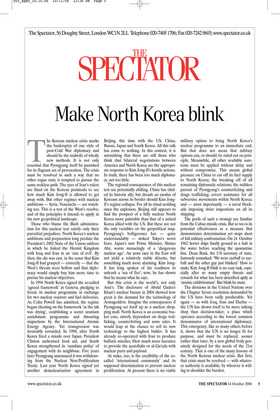Make North Korea blink
The Korean nuclear crisis marks the bankruptcy of one style of post-Cold War diplomacy and should be the midwife of wholly new methods. It is not only essential that Pyongyang itself be punished for its flagrant act of provocation. The crisis must be resolved in such a way that no other rogue state is tempted to pursue the same reckless path. The eyes of Iran’s rulers are fixed on the Korean peninsula to see how much Kim Jong-Il is allowed to get away with. But other regimes with nuclear ambitions — Syria, Venezuela — are watching too. This is a test of the West’s resolve, and of the principles it intends to apply in the new geopolitical landscape.
Those who blame the Bush administration for this nuclear test satisfy only their parochial prejudices. North Korea’s nuclear ambitions and preparation long predate the President’s 2002 State of the Union address in which he linked the Hermit Kingdom with Iraq and Iran in an ‘axis of evil’. By then, the die was cast, in the sense that Kim Jong-Il had grasped — correctly — that the West’s threats were hollow and that diplomacy would simply buy him more time to pursue his nuclear objectives.
In 1994 North Korea signed the so-called ‘agreed framework’ in Geneva, pledging to freeze its nuclear programme in exchange for two nuclear reactors and fuel deliveries. As Colin Powell has admitted, the regime began cheating on the framework ‘as the ink was drying’, establishing a secret uranium enrichment programme and thwarting inspections by the International Atomic Energy Agency. Yet transgression was invariably rewarded. In 1998, after North Korea fired a missile over Japan, President Clinton authorised food aid, and South Korea strengthened its ‘sunshine policy’ of engagement with its neighbour. Five years later Pyongyang announced it was withdrawing from the Nuclear Non-Proliferation Treaty. Last year North Korea signed yet another denuclearisation agreement in Beijing, this time with the US, China, Russia, Japan and South Korea. All this talk has come to nothing. In this context, it is astonishing that there are still those who think that bilateral negotiations between America and North Korea are the appropriate response to Kim Jong-Il’s hostile actions. In truth, there has been too much diplomacy, not too little.
The regional consequences of this nuclear test are potentially chilling. China has chided its historic ally, but dreads an exodus of Koreans across its border should Kim JongIl’s regime collapse. For all its ritual scolding since the explosion, Beijing still appears to find the prospect of a fully nuclear North Korea more palatable than that of a united Korea allied with the US. But these are not the only variables on the geopolitical map. Pyongyang’s belligerence has — quite understandably — stoked Tokyo’s worst fears. Japan’s new Prime Minister, Shinzo Abe, warns menacingly of a ‘dangerous nuclear age’. An arms race in the East will not yield a relatively stable détente, but something much more alarming. Kim JongIl has long spoken of his readiness to unleash a ‘sea of fire’; now, he has shown that he means what he says.
But this crisis is the world’s, not only Asia’s. The disclosure of Abdul Qadeer Khan’s nuclear bazaar in 2004 showed how great is the demand for the technology of Armageddon. Imagine the consequences if Pyongyang set itself up as a nuclear shopping mall. North Korea is an economic basket case, utterly dependent on drugs trafficking, counterfeiting and arms sales. It would leap at the chance to sell its new technology to the highest bidder. It has already co-operated with Iran to produce ballistic missiles. How much more lucrative to provide the ayatollahs or al-Qa’eda with nuclear parts and payload.
At stake, too, is the credibility of the socalled ‘international community’ and its supposed determination to prevent nuclear proliferation. At present there is no viable military option to bring North Korea’s nuclear programme to an immediate end. But that does not mean that military options can, or should, be ruled out on principle. Meanwhile, all other available sanctions must be applied without delay and without compromise. This means global pressure on China to cut off its fuel supply to North Korea; the breaking off of all remaining diplomatic relations; the ruthless pursuit of Pyongyang’s counterfeiting and drugs trafficking; covert assistance for all subversive movements within North Korea; and — most importantly — a naval blockade imposing strict inspections on all its shipping.
The perils of such a strategy are familiar from the Cuban missile crisis. But so too is its potential effectiveness as a measure that demonstrates determination yet stops short of full military confrontation. On 24 October 1962 Soviet ships finally ground to a halt in the water before reaching the quarantine line. Dean Rusk, the US secretary of state, famously remarked, ‘We were eyeball to eyeball and the other guy just blinked.’ How to make Kim Jong-Il blink is no easy task, especially after so many empty threats and rewards for what has been described aptly as ‘atomic exhibitionism’. But blink he must.
The divisions in the United Nations over the Chapter Seven resolution demanded by the US have been sadly predictable. Yet again — as with Iraq, Iran and Darfur the UN has shown itself to be more talking shop than decision-taker, a place which operates according to the lowest common denominator of international diplomacy. This emergency, like so many others before it, shows that the UN is no longer fit for purpose, and must be replaced, sooner rather than later, by a new global body genuinely designed for the needs of the 21st century. That is one of the many lessons of the North Korean nuclear crisis. But first, that crisis must be resolved — with whatever authority is available, by whoever is willing to shoulder the burden.


































































































 Previous page
Previous page